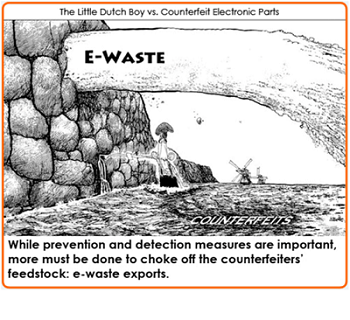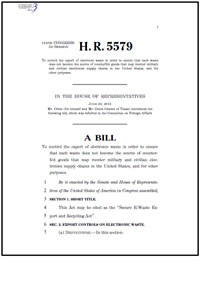Unregulated E-Waste Keeps the Counterfeiters’ Funnel Full
Kristal Snider
ERAI, Inc
Unregulated E-Waste Keeps the
Counterfeiters’ Funnel Full
 By: Kristal Snider, ERAI By: Kristal Snider, ERAI
It is 2016: fifteen years since
China was admitted to the WTO and the first counterfeit part was
reported to ERAI; a decade since ERAI’s President made a second trip to
China to see firsthand how e-waste was being used to fuel what has been
referred to as a “counterfeit epidemic”; and nine years since I wrote
and distributed a report titled “A Time For Change” highlighting the
devastating impact e-waste converted to counterfeits was having on the
supply chain. But it was less than five years ago, on November 8, 2011
when the Senate Armed Services Committee released a report titled "The Committee’s Investigation Into Counterfeit
Electronic Parts In The Department Of Defense Supply Chain" in
which the Committee directly identified counterfeit electronic parts as
a “national security risk”, that counterfeit avoidance and awareness
started to pick up steam. Government, industry, enforcement agencies and
all tiers of the supply chain from independent distributors to prime
contractors have united, collaborated and worked tirelessly to produce
standards, studies, white papers, trainings, legislation, as well as
products and services which have forever changed the way electronic
parts and material are purchased, inspected, tested, sold and
integrated. We can be proud of these accomplishments, but there is more
to do.
 E-waste
dumping drives the counterfeit electronics components industry, kills
small businesses, threatens national security and funds criminal
organizations, all of which are taking an enormous toll on the global
economy and human safety. Despite the federal government’s awareness of
these risks, the United States is the only developed nation that has not
ratified the Basel Convention which was designed to limit the movement
of hazardous waste from developed to developing countries and, despite
several attempts, no federal e-waste recycling mandate currently exists.
Two previous bipartisan bills were introduced which would forbid U.S.
companies from exporting e-waste: H.R.2284 - Responsible Electronics
Recycling Act (introduced June 22, 2011) and H.R.2791 - Responsible
Electronics Recycling Act (introduced July 23, 2013). Both versions of
the bill died. E-waste
dumping drives the counterfeit electronics components industry, kills
small businesses, threatens national security and funds criminal
organizations, all of which are taking an enormous toll on the global
economy and human safety. Despite the federal government’s awareness of
these risks, the United States is the only developed nation that has not
ratified the Basel Convention which was designed to limit the movement
of hazardous waste from developed to developing countries and, despite
several attempts, no federal e-waste recycling mandate currently exists.
Two previous bipartisan bills were introduced which would forbid U.S.
companies from exporting e-waste: H.R.2284 - Responsible Electronics
Recycling Act (introduced June 22, 2011) and H.R.2791 - Responsible
Electronics Recycling Act (introduced July 23, 2013). Both versions of
the bill died.
On
June 24, 2016 Rep. Gene Green (D-TX), along with Rep. Paul Cook (R-CA),
launched a third attempt to stop the flow of electronic waste to China
and other countries known for producing counterfeit electronic parts by
introducing H.R. 5579, the Secure E-waste Export and Recycling
Act (SEERA).
According to the Coalition for American Electronics
Recycling (CAER), the voice of the emerging e-waste recycling industry
on Capitol Hill, a significant portion of U.S. e-waste ends up with sham
recyclers and exporters willing to ship unprocessed and untested, used
electronics overseas. I spoke with Robert Houghton, CEO of Sage
Sustainable Electronics, a leading provider of IT asset retirement
services, a co-founder of CAER and a CAER steering committee member to
better understand why past attempts to pass similar legislation did not
pass and to find out what we can do to support SEERA.
 KS: E-waste is said to be
the fastest growing segment of our domestic waste stream. Even though
China surpassed the U.S. as the world’s largest e-waste generator,
supporters of SEERA contend counterfeiters still rely on our exports
since the U.S. remains one of the few countries that allows unrestricted
exports of untested, nonworking e-scrap. How will this bill change
that? KS: E-waste is said to be
the fastest growing segment of our domestic waste stream. Even though
China surpassed the U.S. as the world’s largest e-waste generator,
supporters of SEERA contend counterfeiters still rely on our exports
since the U.S. remains one of the few countries that allows unrestricted
exports of untested, nonworking e-scrap. How will this bill change
that?
RH: SEERA will combat electronics
counterfeiters by substantially reducing the supply of materials they
use as raw materials – unprocessed e-waste exported from the United
States. SEERA, which was introduced last week as H.R. 5579, will
restrict exports of untested, non-working electronic scrap under the
Export Administration Act of 1979 (EAA) that regulates exports for
national security and foreign policy reasons.
The legislation does not apply to
new devices, and will not limit the export of most used electronics,
providing key exemptions for categories at low risk for use as feedstock
for counterfeiters: - Tested,
working used electronics
- E-scrap that has
been shredded or demanufactured may be exported for use as feedstock for
smelters and other recycling
processes
- Recalled electronics may be
exported for repairs
“China
regularly counterfeits electronics and puts these dangerous products,
including critical military equipment, back into the market. These
electronic components threaten the reliability and safety of a wide
range of technology. SEERA will ensure we’re not exporting electronic
scrap materials that come back to us as counterfeit parts and undermine
the reliability of technology essential to our national
security.”
- Rep.
Paul Cook (R-CA) This approach is
consistent with CAER's long-standing support for free trade in
value-added products, such as the commodities generated from the
recycling process, while restricting export of untested, nonworking
e-scrap that provide essential raw materials for counterfeiters. In
addition to combating counterfeiting, these policies will create
American jobs, promote investment in our domestic recycling and increase
trade in tested, working electronics. A recent study found that this
approach will create 42,000 U.S. jobs with an annual payroll of $1
billion, with more added as the demand for services continues to
grow.
KS: This is CAER’s third attempt to
pass legislation. Previously the coalition rallied behind H.R.2284 and
H.R.2791 but neither of these bills passed. Why do you think SEERA will
be successful?
RH: We think SEERA will be successful
because it responds to the growing concerns on Capitol Hill about the
threat of counterfeits. In advocating for previous bills, we focused
primarily on the potential for job creation and business growth with
security as a secondary focus. However, many lawmakers told us that
while job creation was important to them, the national security
implications were much more pressing. SEERA provides all the benefits of
the previous bills with a stronger emphasis on security. And where
previously the EPA was slated for enforcement, SEERA designates Customs
and Border Protection as the enforcing agency, which we believe will be
more effective. The electronics industry can play an important role by
showing broad support for this legislation.
KS: We spoke
about how a bill becomes a law and why timing and broad industry support
is imperative in getting one passed. Can you explain the urgent need
for action to support SEERA so ERAI Members and our readers understand
why their immediate support is needed?
RH: We need
Congress to act by the end of the year when the current session
concludes. Since the start of the 113th Congress in early 2015, we have
devoted extensive time and energy to educating Congressional leaders
about this issue and working to refine a legislative approach. With the
session concluding in a few months, we need Congress to act. The sooner
we can get SEERA enacted, the faster we can begin choking off the supply
of feedstock that is undermining our security.
“This
problem will continue to grow unless Congress acts to ensure that
electronic waste is recycled responsibly in the United States and out of
the hands of counterfeiters overseas. The Secure E-waste Export and
Recycling Act (SEERA) will help ensure our servicemen and women have
reliable technology to protect our country and create thousands of jobs
in Texas and recycling facilities around the country.”
“I have worked on e-waste for
nearly a decade and look forward to Congress holding hearings on this
bipartisan legislation and seeing it come before the full House for a
vote.”
- Rep. Gene
Green (D-TX) KS: ERAI
has created a new E-Waste Knowledge Center in order to help
individuals and organizations better understand electronic waste and the
danger it poses as a source of material for counterfeiters as well as
the significance of the of the Secure E-Waste Export and Recycling Act
(H.R. 5579). We want ERAI Members to be fully informed and for those
individuals and companies that see the need for and value of this
legislation to show their support by writing to Congress. As we have
already learned, introducing legislation and getting it enacted into law
are two different things. As an expert in this area I am hoping you can
explain the importance of writing to Congress.
RH: Nothing is
more persuasive for Congressional offices than hearing from their
constituents. Right now it is especially critical that we show support
to members of the House Foreign Affairs Committee. If your
company or home is located in the district of a member of this
committee, please contact us and we will assist you in preparing a
letter. Use this easy online tool to verify in which District you
are located. A list of Foreign Affairs members is available here. However, there is also value in
writing to other members of Congress outside Foreign Affairs. Feel free
to contact us via email if you have questions
or need help.
KS: What else do you want ERAI Members
and readers to know?
RH: Now is the time for everyone
concerned about counterfeits to speak up – your voice can make a
difference. Electronics counterfeiting is a complex, multifaceted
challenge, and SEERA can be a key part of a solution that complements
the good work on procurement reform and other measures.
KS: Thank you
Robert for your time, your expertise and the extraordinary work done by
everyone at CAER.
What You Can Do Today
Write a letter of support to Congress. We have included a
sample letter of support for those
interested in backing this legislation.
Join
CAER
ERAI members are welcome
to join CAER as Supporting Members at no cost. This category of
membership is for organizations that are committed to the cause but are
not part of the American electronics recycling industry. Supporting
members are listed on our website and receive periodic updates on our
progress along with action alerts.
CAER Membership
Application
http://www.americanerecycling.org/images/CAER_Member_Form.pdf
As an industry we have already
proven, despite broad differences of opinion, when we unite we can truly
make a difference. Controlling the exportation of e-waste will not
eliminate counterfeit risk but we do believe it will reduce the number
of counterfeits entering the supply chain.
 About
Robert About
Robert
Robert Houghton has
served as CEO of leading companies in electronics reuse and recycling
for twenty years. He served as Interim Executive Director of the
e-Stewards electronics recycling certification program, and is a
cofounder of the Coalition for American Electronics Recycling (CAER).
Robert is currently CEO of Sage Sustainable Electronics, www.sageSE.com.
About CAER
(www.americanerecycling.org)
The Coalition for American Electronics Recycling is the
voice of the e-waste recycling industry on Capitol Hill. CAER represents
more than 140 companies that operate a combined 300 processing
facilities in 35 states, Puerto Rico and the District of Columbia. These
companies share in the philosophy that electronics recycling should be
performed securely to protect our nation’s security and for the benefit
of the American economy. For the last several years they have been
working on federal legislation to address the exportation of untested,
nonworking e-waste that counterfeiters use as cheap raw
material.
You can
reach CAER at members@americanerecycling.org
Additional
Reading
Reps. Green and Cook Introduce Bipartisan
National Security Bill
https://green.house.gov/media-center/press-releases/reps-green-and-cook-introduce-bi-partisan-national-security-bill
Electronics Recycling
Leaders Praise Introduction of Secure E-Waste Export and Recycling Act
(SEERA)
http://www.americanerecycling.org/images/SEERAIntroduction_FINAL_6_27_16.pdf
The Secure E-Waste Export
and Recycling Act (SEERA) – Overview
http://www.americanerecycling.org/images/SEERA_Summary.pdf
Unregulated E-Waste
Exports Fuel Counterfeit Electronics That Undermine U.S. National
Security
http://www.americanerecycling.org/images/Counterfeiting_position_paper_3_1-16.pdf
Counterfeit Electronic
Parts: Manufacture of and Avoidance
http://articles.sae.org/13923/
E-Waste Export Controls
Key to Battling Counterfeiters
http://www.nationaldefensemagazine.org/archive/2016/March/Pages/E-WasteExportControlsKeytoBattlingCounterfeiters.aspx
Electronic Waste Rules
Could Help Thwart Flow of Counterfeit Parts
http://www.nationaldefensemagazine.org/archive/2015/February/pages/ElectronicWasteRulesCouldHelpThwartFlowofCounterfeitParts.aspx
SEE MORE BLOG ENTRIES
|